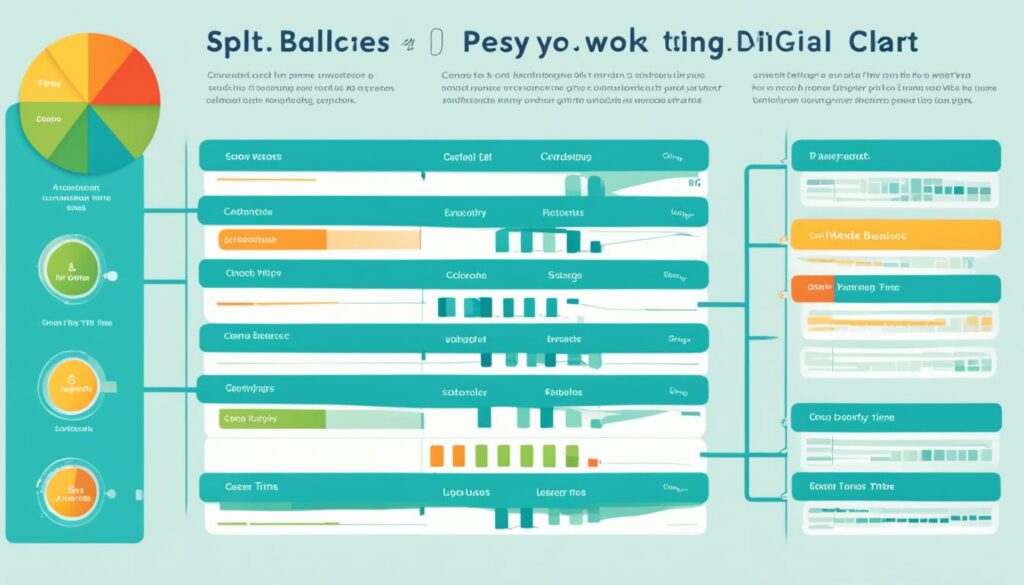Wow! **Can you believe** that **the average American adult** spends more than *11 hours a day* with media? **Notifications ping** and screens glow all day. It’s obvious: managing screen time and **digital wellness** is super important. Healthy tech habits are crucial. Finding a balance can keep both our **mind and body** in good shape. Let’s dive into ways to enjoy technology while staying healthy.
Research now shines a spotlight on the pressing need to establish limits on our digital consumption. Excessive use can lead to obesity, diabetes, high blood pressure, and poor heart health, not to mention the disruptions to our sleep patterns. Therefore, achieving digital balance isn’t just about reducing the number of hours we spend in front of our devices; it’s about being consciously aware of our tech habits and taking proactive steps to manage them. Together, we can navigate the challenges of a connected life by setting boundaries and intentions for our screen use.
Key Takeaways
- Understanding that managing screen time is crucial for maintaining good health and wellbeing.
- Adopting digital wellbeing practices to counter the adverse effects tied to excessive electronic use.
- Developing healthy tech habits through awareness and intentional action.
- Achieving electronic device balance to benefit our mental and physical health.
- Embracing a lifestyle that values digital balance, ensuring that our devices enhance rather than detract from our daily experiences.
The Importance of Digital Detox in Daily Life
As our daily lives become increasingly saturated with digital stimuli, recognizing the importance of a digital detox is essential. Implementing tech boundaries and fostering screen-free zones are vital to maintain mental health and well-being.
Understanding the Adverse Effects of Excessive Screen Time
Excessive engagement with digital devices can lead to a variety of mental and physical health issues. The importance of setting tech boundaries to mitigate these effects cannot be overstated. Among them, a significant increase in stress and a decrease in attention span are paramount.
Strategies for Implementing Regular Tech-Free Intervals
Creating regular screen-free zones in both our personal and professional environments promotes a healthier lifestyle. This practice is not just about reducing screen time; it’s about enhancing the quality of both our work output and our personal interactions.
Real-World Benefits of Unplugging
Engaging in a digital detox by setting tech boundaries has tangible benefits, like enhanced sleep quality and better personal relationships. Taking time to unplug helps us to recover from the cognitive load of constant digital connectivity, allowing for deeper, more meaningful interactions in the real world.
| Benefits | With Digital Detox | Without Digital Detox |
|---|---|---|
| Sleep Quality | Improved | Poor |
| Stress Levels | Lower | Higher |
| Focus and Productivity | Enhanced | Reduced |
| Relationships | Strengthened | Weakened |
As evidenced, establishing screen-free zones and respecting tech boundaries significantly enhances our overall quality of life. Engaging in regular digital detoxes can lead to improved mental and physical health, proving the importance of balancing our digital and real-world interactions.

Life Unplugged: A Digital Detox Workbook
As an affiliate, we earn on qualifying purchases.
As an affiliate, we earn on qualifying purchases.
Identifying Symptoms of Screen Addiction and Its Impact
In our quest to understand the effects of our digital habits, we’re increasingly facing terms like screen addiction symptoms, digital addiction, and the health impact of screen time. These phrases aren’t just buzzwords; they represent real and present hazards that necessitate deeper exploration and proactive management.

Evaluation of Screen Time and Its Correlation to Health Issues
One cannot overlook the direct correlation between prolonged screen usage and various health issues. By tracking our digital consumption, we can identify patterns linked to screen addiction symptoms and take necessary actions. This evaluation is crucial in mitigating the risk of developing chronic health problems associated with excessive screen exposure.
Physical and Psychological Consequences of Prolonged Screen Use
The consequences of untreated digital addiction go beyond mere digital fatigue. They extend to physical ailments such as eye strain, back and neck pain, and disrupted sleep patterns. Psychologically, prolonged engagement with screens can lead to increased anxiety, mood fluctuations, and a noticeable dip in personal well-being. Recognizing these signs is the first step towards restoring balance in our digital lives.
By addressing the health impact of screen time, we empower ourselves to take necessary breaks and implement healthier viewing habits. It’s about striking a balance that aligns with our overall health and life goals.

Screen Time For Kids: Reward Tickets – Time Tokens for Kids and Teenagers
As an affiliate, we earn on qualifying purchases.
As an affiliate, we earn on qualifying purchases.
Technological Tools and Apps for Monitoring Screen Time
As we continue to embrace the digital age, the importance of managing our digital exposure cannot be overstated. Utilizing digital tools and tech management apps is essential for maintaining a healthy digital diet. These applications not only facilitate screen time tracking but also empower us to make informed decisions about our device usage.
With the plethora of apps available, choosing the right one can significantly impact how effectively we monitor and manage our daily screen time. These tools provide detailed insights into our tech habits, allowing us to set achievable goals for reducing screen time on problematic apps or devices.
- Screen time tracking apps typically offer real-time data on the number of hours spent on each app, helping us to pinpoint areas where we can cut down.
- Digital tools come with features such as scheduling focus times where only critical applications are allowed, thus minimizing distractions.
- Tech management apps often have the ability to set up customizable alerts that remind us to take frequent breaks from our screens, promoting better eye health and concentration.
Using these tools, we transform our devices from potential distractions into allies in our quest for digital wellness. By regularly reviewing our app usage statistics and tweaking our habits accordingly, we can enhance our productivity and safeguard our mental health.

Here is an example of popular technology tools that have proven effective in managing screen time and enhancing digital mindfulness:
| App | Features | User Friendliness |
|---|---|---|
| FamilyTime | Screen time limitation, real-time location tracking, app blocker | High |
| RescueTime | Automatic time tracking, detailed reports, goal setting | Medium |
| Stay Focused | App blocker, website filter, time restrictions on apps | Medium |
Each of these tools offers unique functionalities designed to cater to various preferences and needs. By integrating these digital tools into our daily routines, we can boost our screen time management strategies and adopt healthier digital habits that contribute to our overall well-being.

Kavaas Game Zone Neon Signs for Gaming Room Decor – LED Light Neon Sign for Teens Bedroom Decorations – Best Gamer Gifts for Boys, Kids
【DAZZLING & UNIQUE VISUAL APPEAL】Make your gaming cave stand out as the ultimate entertainment spot with the game…
As an affiliate, we earn on qualifying purchases.
As an affiliate, we earn on qualifying purchases.
Mindfulness Practices to Offset Digital Overload
In our fast-paced digital world, integrating mindfulness practices into our daily routines is more crucial than ever. These practices, including yoga and meditation, not only help us manage digital overload but also enhance our overall mental and physical well-being.
The Role of Yoga and Meditation in Promoting Digital Balance
Yoga and meditation are foundational mindfulness practices that help bridge the gap between our physical and digital lives. By fostering deep, intentional breathing and promoting physical posture awareness, yoga can alleviate the physical discomfort often associated with prolonged tech usage. Meditation, on the other hand, cultivates mental clarity and focus, key components of digital mindfulness.
Incorporating Mindfulness into Your Daily Routine
Establishing a routine that includes mindfulness practices such as meditation and yoga can significantly reduce the stress caused by digital overload. Even a few minutes of meditation each day can improve concentration and reduce the impulsiveness to check digital devices frequently. Integrating these practices helps maintain a balanced approach to technology, making digital mindfulness an accessible goal for everyone.
Podcasts and Resources to Enhance Mindful Living
Engaging with digital resources thoughtfully can complement our mindfulness practices. Podcasts like The Happiness Lab offer insights into the science of happiness, encouraging practices that can mitigate the effects of digital saturation. Such resources provide practical tips for weaving mindfulness, yoga, and meditation more seamlessly into our lives.

| Mindfulness Practice | Benefits | Recommended Duration |
|---|---|---|
| Yoga | Improves flexibility, reduces stress, enhances mental focus | 20-30 minutes |
| Meditation | Increases awareness, lowers stress, promotes emotional health | 10-20 minutes |
| Podcasts (e.g., The Happiness Lab) | Provides psychological insights, enhances personal growth | Variable per episode |

livho High Tech Blue Light Glasses – Advanced Blue Light Blocking Computer Glasses – Screen Fatigue & UV Protection
Elevate your screen time comfort with these stylish women's/men's eyewear frame blue light blocking glasses, designed to reduce…
As an affiliate, we earn on qualifying purchases.
As an affiliate, we earn on qualifying purchases.
Critical Time Management: Budgeting Your Screen Time
In our quest for a balanced digital lifestyle, time budgeting is an essential strategy. By structuring our daily device usage, we not only enhance our productivity but also foster mindful tech use. It’s about making conscientious decisions to allocate specific blocks of time for different digital activities, which sustains our focus and well-being.

Utilizing tools like Toggl and the built-in screen time features on smartphones, we can gather insightful data that aids in setting realistic goals for digital engagement. This data-driven approach ensures that our digital time management is both effective and adaptable to our changing needs.
| Activity | Time Budgeted | Tools Used |
|---|---|---|
| Emails | 1 hour per day | Smartphone, Laptop |
| Social Media | 30 minutes per day | Smartphone |
| Professional Learning | 2 hours per day | Tablet, Online Courses |
| Leisure Browsing | 45 minutes per day | Smartphone, Tablet |
Through careful time budgeting, we prevent the pitfalls of unplanned scrolling and excessive screen time. We encourage all to adopt these practices to cultivate a balanced digital routine that respects both our professional productivity and personal relaxation time.
Smart Notification Setups to Minimize Distractions
In our quest to optimize productivity and mental well-being, addressing notification management emerges as a critical step. By refining how our devices interrupt us, we can significantly succeed in minimizing digital distractions. Effective management can be achieved through deliberate modifications in notification settings, alongside adopting strategies for intentional social media use.
Customizing Notification Settings to Ensure Focus
Customizing individual notification settings plays a pivotal role in maintaining focus throughout the workday. Notifications, if not managed properly, can pull us away from tasks at hand, reducing efficiency and increasing stress. By tailoring alerts on our phones and computers, we ensure that only the essential notifications break through, preserving our concentration and enhancing productivity.
Strategies for Intentional Social Media Consumption
Social media platforms are designed to capture and retain our attention. However, by applying intentional use practices, we can control our interaction with these platforms rather than letting them control us. Schedule specific times to check social media, keep sessions brief, and use features like “Do Not Disturb” to prevent notifications from causing unnecessary interruptions.
Implementing these strategies doesn’t just minimize distractions but also empowers us to engage more deeply with the world and people around us without the constant pull of digital notifications.
| Strategy | Description | Benefits |
|---|---|---|
| Notification Scheduling | Assign specific times for checking notifications | Lowered stress, enhanced focus |
| High Priority Settings | Allow only high-priority apps to send notifications | Reduces frequency of interruptions |
| Social Media Time Limits | Set daily limits for each platform | Prevents excessive use and promotes intentional interactions |

Promoting Digital Balance in Everyday Life
Integrating tech-life integration into our daily routines is more than just a necessity; it’s a pathway to enhanced well-being. By fostering healthy digital habits, we ensure that technology serves to support rather than disrupt our lives. This commitment to promoting digital balance is crucial in creating a life where technology and personal well-being harmoniously coexist.

We’ve seen firsthand how the mindful application of technology can significantly improve our day-to-day experiences. For instance, utilizing apps that limit screen time or signal the need for a break encourages us to engage more with the physical world, thus promoting a healthy tech-life balance.
| Strategy | Tools | Impact |
|---|---|---|
| Digital Time Tracking | Screen Time Features (iOS, Android) | Enhances self-awareness of tech usage |
| No-screen Zones | App Blockers | Promotes periods of tech-free rest |
| Scheduled Tech Breaks | Alarm/Reminder Apps | Prevents digital overload |
In our journey to promote digital balance, it is imperative that we make intentional choices about disconnecting from digital devices. This might include setting specific times to check emails or social media, thereby avoiding the compulsive checking of notifications, which is often a major distraction.
Ultimately, our goal is to create an environment where technology aids our productivity without encroaching on the quality of our real-life interactions or personal downtime. Achieving this balance is not only beneficial for our individual health but also instrumental in fostering healthier relationships and a more engaged community.
Low-Tech Solutions for a High-Tech World
In our journey towards digital wellbeing, we must appreciate the value of balancing high-tech engagement with low-tech traditions. The latter can serve as a counterbalance, grounding us in the tangible and fostering connections that transcend pixels and screens. As we explore this theme, we also take a closer look at how family media plans and offline activities can revitalize our daily lives.
Implementing Family Media Plans and Offline Days
The purposeful design of a family media plan serves as a cornerstone for digital health within the household. By establishing guidelines on the use of electronics, we not only moderate screen time but also carve out space for cherished offline activities. Scheduled offline days act as a collective pause from the digital stream, allowing us and our loved ones to reconnect with the non-digital facets of our world, fostering a harmonious balance between online and physical realms.
Rediscovering the Joy of Analog Activities
Analog hobbies such as reading physical books, delving into arts and crafts, or engaging in outdoor sports, serve as fortifying pillars against the encroachment of constant connectivity. By rediscovering the joy of these activities, we create not just pastimes, but rituals that reconnect us with our intrinsic creativity and playfulness. The celebration of these experiences enriches the fabric of our lives, strengthening our sense of community and personal fulfillment away from the glow of omnipresent screens.









